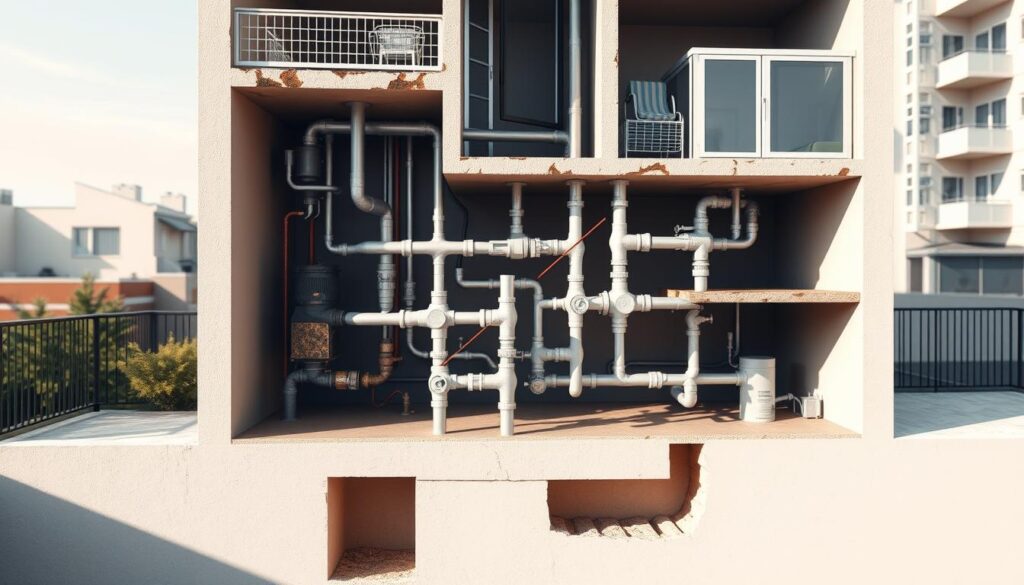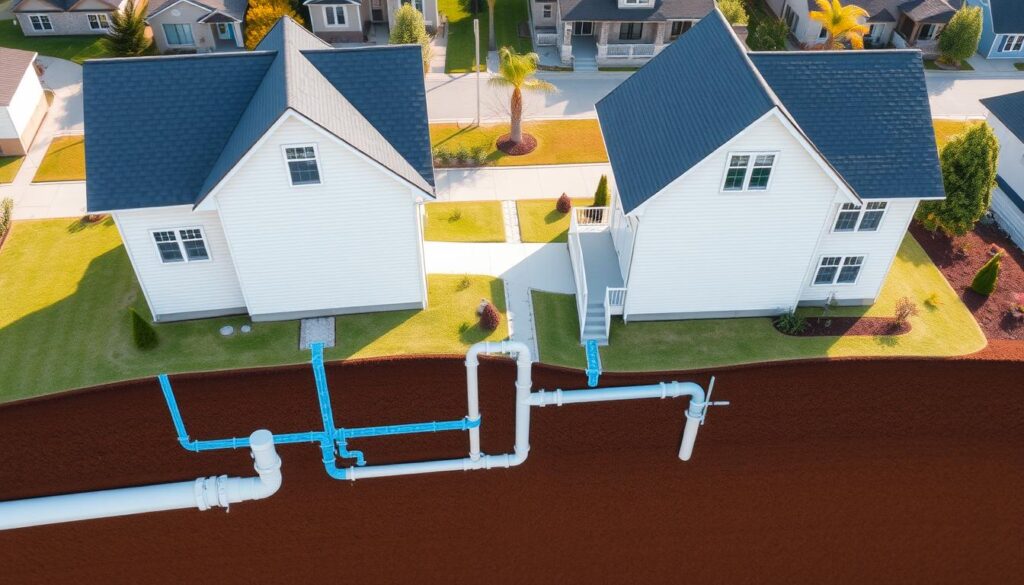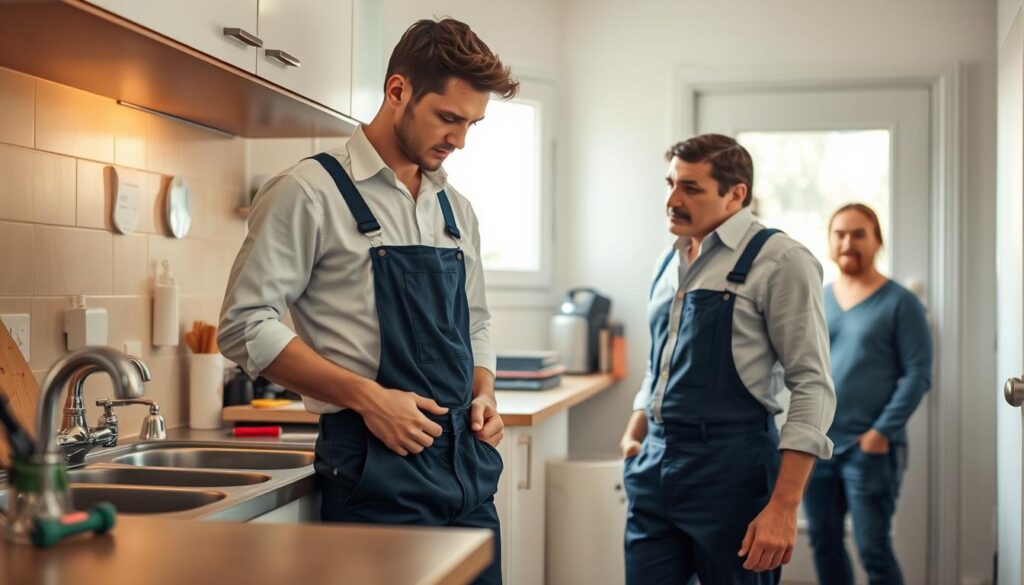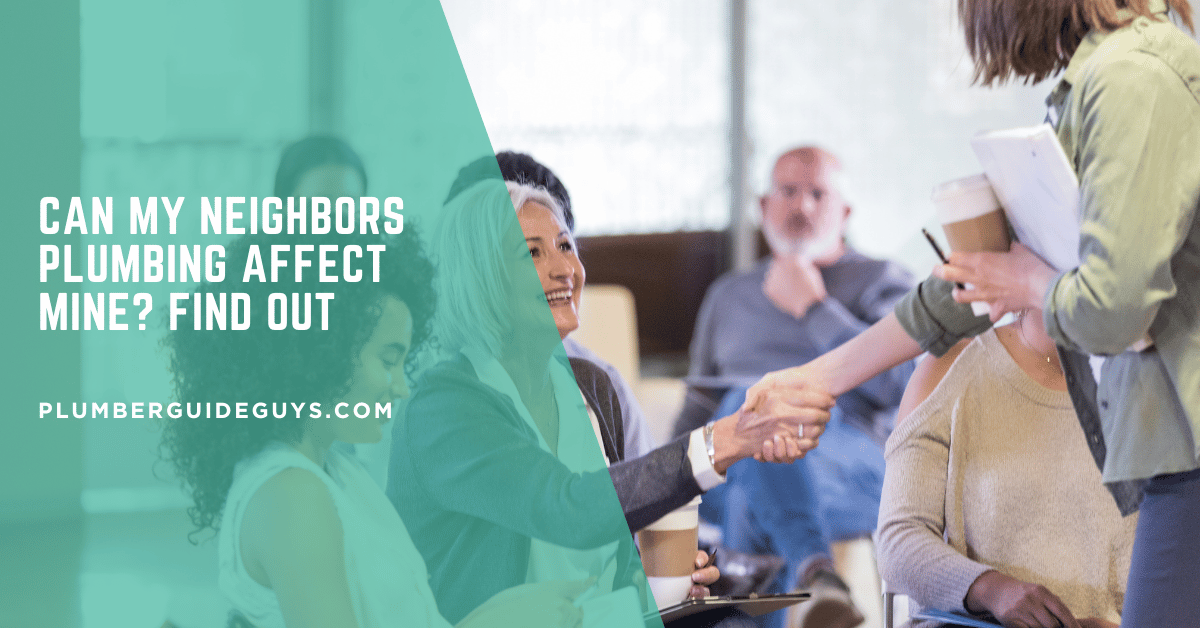Affiliate Disclosure
Plumber Guide Guys is a participant in the Amazon Services LLC Associates Program, an affiliate advertising program designed to provide a means for sites to earn advertising fees by advertising and linking to Amazon.
Can My Neighbors Plumbing Affect Mine? Ever thought about how your neighbor’s plumbing troubles might affect your home’s water? Shared plumbing issues are more common than people think. They can pose risks that go beyond just your property.

When homes share plumbing systems, problems in one can affect another. It’s important to understand these connections. This helps protect your home and avoid unexpected water issues.
In cities and suburbs, many homes share water lines, sewer connections, and drainage. This means a problem in your neighbor’s pipes could affect your home too.
Key Takeaways
- Shared plumbing systems can create unexpected cross-property issues
- Neighbor’s pipe problems might impact your water quality and pressure
- Understanding interconnected plumbing reduces possible risks
- Early detection of shared plumbing problems prevents costly repairs
- Communication with neighbors is key to keeping plumbing systems healthy
Table of Contents
Understanding Shared Plumbing Systems in Residential Properties
Shared plumbing systems are complex networks that connect multiple residential units. They create interactions between neighboring properties. These systems need careful management to avoid problems.
Residential properties often have plumbing systems that connect. These systems affect water supply and waste management. Understanding them helps homeowners protect their property and spot risks.
Types of Shared Plumbing Connections
- Main sewer line connections
- Vertical stack pipe systems
- Water supply line intersections
- Drainage network sharing
Common Points of Intersection
Critical points in shared plumbing systems can lead to building code violations. These areas need extra attention to avoid issues:
- Underground sewer line junctions
- Shared water meter connections
- Apartment complex vertical pipe systems
- Townhouse interconnected drainage networks
Building Code Requirements for Shared Systems
Local municipalities have strict rules for multi-unit plumbing systems. Homeowners must follow these to avoid legal and infrastructural problems.
Proper maintenance and compliance with building codes can prevent costly repairs and disputes between neighbors.
Regular inspections and professional assessments can spot building code violations early. This helps avoid big problems.
Signs Your Neighbor’s Plumbing is Affecting Your Home
Spotting water leaks from your neighbor’s house is key to avoiding big damage. Your home’s plumbing is linked to your neighbor’s. Problems with their drainage can quickly turn into your headache.
Look out for these important signs that your neighbor’s plumbing might be affecting your home:
- Unexplained water puddles near shared walls
- Sudden drops in water pressure
- Unusual gurgling sounds from drains
- Persistent musty odors
- Unexpected increases in water utility bills
When drainage issues from next door show up, they can be subtle but serious. Wet spots on walls or floors might mean hidden leaks from your neighbor’s pipes.
Experts say to keep a record of any problems. Take photos, measure water, and note when plumbing acts weird. These details are important if you need to talk about fixing things or legal actions.
“Early detection prevents catastrophic damage” – Plumbing Maintenance Experts
Knowing these signs helps you protect your home and keep good relations with neighbors. By tackling plumbing issues early, you can avoid big problems.
Can My Neighbors Plumbing Affect Mine: The Complete Guide
Dealing with residential plumbing can be tough, even more so when homes share plumbing systems. It’s key to know how your neighbor’s plumbing might affect your home. This is for keeping your living space safe and working well.
Shared plumbing systems bring unique problems for homeowners. Issues like water pressure problems from neighbors can mess with your daily water use and comfort.
Direct Impact on Water Pressure
Your home’s water pressure can change a lot because of your neighbor’s plumbing. Things that can cause pressure changes include:
- Shared water supply lines
- Using water at the same time in connected homes
- Old plumbing
- Pipes that are the wrong size
When neighbors change their plumbing without thinking about shared lines, it can cause unexpected pressure changes in your home.
Cross-Contamination Risks
Sharing plumbing with neighbors can be risky for your health. Bad connections or damaged pipes can mix harmful substances between homes.
“Prevention is always better than cure when it comes to plumbing cross-contamination.” – Professional Plumbing Association
Shared Responsibility Zones
Many homes have areas where plumbing duties are shared. These spots need neighbors to work together and talk openly to avoid problems.
Knowing about these shared systems helps protect your home. It ensures you have safe, reliable water.
Understanding Sewer Line Connections Between Properties
Sewer line connections between properties are complex systems. They can greatly affect your home’s plumbing. These networks often link several homes, creating shared drainage paths that need careful handling.
When homes share sewer lines, several important factors come into play. Homeowners need to know about the risks and maintenance challenges these shared systems bring.
- Underground sewer lines can span multiple property boundaries
- Shared connections increase the risk of plumbing issues between homes
- Maintenance can get complicated
Understanding sewer line connections between properties helps homeowners tackle problems early. These shared systems pose unique challenges that need teamwork to solve.
| Connection Type | Potential Risks | Maintenance Complexity |
|---|---|---|
| Direct Lateral Connection | Root intrusion | High |
| Shared Main Line | Blockage transfer | Medium |
| Municipal Intersection | Pressure variations | Low |
Regular checks and proactive care are key for sewer line connections between properties. Professional plumbers can guide you through these complex systems. They help prevent problems before they get worse.
Knowing your property’s sewer line setup is the first step in avoiding plumbing surprises.
By grasping the details of shared sewer line connections, you can safeguard your property. You’ll keep a working drainage system that benefits many homes.
Common Problems with Shared Plumbing Systems
Shared plumbing systems can cause big problems for homeowners. Knowing these issues helps keep your home safe and healthy. These problems can pop up without warning, messing up your daily life.
Properties with shared plumbing face special risks. These can affect many homes at once. Water pressure issues between neighbors are a big problem, caused by many things.
Blockages and Backups: Hidden Dangers
Blockages in shared plumbing can turn into big headaches fast. They often come from:
- Debris in common pipes
- Bad waste disposal
- Tree roots in pipes
- Old pipes
Water Pressure Complications
Water pressure issues can really mess with your home’s water. If one house uses a lot of water or has pipe damage, it affects others. Sudden drops or surges in pressure might mean there’s a problem with shared plumbing.
Cross-Contamination Risks
Cross-contamination is a big worry in shared plumbing. Health risks can happen when:
- Sewage lines get damaged
- Pipe connections aren’t sealed right
- Backflow prevention fails
Keeping an eye on things and getting regular checks can help avoid these problems. This way, your home stays safe and works well.
Legal Rights and Responsibilities in Shared Plumbing

Dealing with shared plumbing laws can be tricky for homeowners. Building code violations often lead to complex situations. It’s important to know your property rights and local rules.
Here are your main legal duties in shared plumbing systems:
- Understanding property boundary limitations
- Recognizing easement rights
- Identifying possible building code violations in plumbing
- Knowing when to seek professional legal advice
Property owners need to know local rules for shared plumbing. Talking to neighbors and local authorities early can avoid legal problems.
Important legal points include:
- Determining who does maintenance
- Figuring out who’s liable for damages
- Understanding how to fix or replace plumbing
- Spotting building code violations
If issues come up, keep records of talks and try mediation. Plumbers and building inspectors can help with complex rules.
“Knowing local building codes is your best defense against legal issues in shared plumbing systems.”
Always check with local building departments and a real estate lawyer. They can help you understand your rights and duties in shared plumbing.
How Tree Roots Can Affect Multiple Properties’ Plumbing
Tree roots are a big problem for underground plumbing. They can cause drainage issues that lead to expensive fixes. These roots look for moisture and nutrients, making sewer lines a perfect spot to grow.
Your property’s drainage system is at risk from underground roots. These roots can damage shared plumbing networks. Trees near property lines can have roots that spread far, causing damage.
Root Intrusion Detection Techniques
Finding root problems early can save a lot of money. Plumbers use special tools to spot these issues:
- Video camera pipe inspections
- Acoustic listening devices
- Ground-penetrating radar surveys
- Thermal imaging technology
Prevention Strategies for Root Intrusion
To keep your plumbing safe, take these steps:
- Plant trees far from sewer lines
- Put root barriers around pipes
- Choose trees with less aggressive roots
- Get regular pipe checks from pros
Getting help from professionals can prevent big plumbing problems.
Preventing Cross-Property Plumbing Issues
To keep your home safe from plumbing problems from next-door neighbors, you need to act early and talk to your neighbors. Knowing the risks helps keep your plumbing working right.
Here are some ways to handle shared plumbing:
- Get regular plumbing checks from experts
- Talk clearly with your neighbors
- Watch how water flows
- Keep up with maintenance plans
Stopping plumbing problems starts with knowing your plumbing setup. Understanding where your pipes meet your neighbors’ can spot trouble spots.
Good maintenance steps include:
- Book yearly plumbing checks
- Keep records of shared pipes
- Make plans with neighbors for upkeep
- Put in devices to stop backflow
“Prevention is always more cost-effective than emergency repairs” – Professional Plumbing Association
Keeping your place safe needs constant watch, talking, and upkeep. Working with neighbors and experts can lower risks from shared plumbing.
When to Contact Professional Plumbers vs. Legal Help
Dealing with plumbing problems between neighbors can get tricky. Knowing when to call for help is key to keeping your home safe and avoiding disputes.

Homeowners face tough choices when shared plumbing systems cause issues. The best course of action depends on the problem’s severity and type.
Emergency Situations Requiring Immediate Action
Some plumbing problems need quick action:
- Sewage backups affecting multiple units
- Significant water pressure drops
- Signs of possible building code violations in plumbing
- Visible water damage between connected properties
Documentation Requirements for Plumbing Disputes
Having the right documents is vital for plumbing disputes with neighbors. Homeowners should gather all the evidence they can:
| Documentation Type | Purpose | Recommended Action |
|---|---|---|
| Photographic Evidence | Record visible damage | Take clear, dated photos |
| Professional Inspection Reports | Verify technical issues | Request detailed written assessments |
| Communication Records | Document neighbor interactions | Keep emails and written correspondence |
“Documentation is your strongest defense in resolving complex plumbing disputes between neighbors.” – Professional Plumbing Association
For complex plumbing issues, it’s wise to talk to experts. They know local building codes and shared property rules. This can avoid expensive mistakes and legal trouble.
Managing Shared Plumbing Maintenance
Keeping multi-unit plumbing systems in good shape needs careful planning and teamwork. It starts with clear talks and tackling problems together.
Success in managing shared plumbing comes from a few key steps:
- Make a detailed maintenance plan
- Set up a fund for repairs and upgrades
- Decide who does what
- Have regular checks by experts
For multi-unit plumbing, owners should focus on preventing problems. This way, you catch issues early and avoid expensive fixes later.
“Proactive maintenance is always cheaper than reactive repairs” – Professional Plumbing Association
Important maintenance steps include:
- Check the system every three months
- Keep records of all maintenance
- Track repair history
- Have clear ways to talk to each other
Being open and talking often are key to managing multi-unit plumbing well. By following these steps, you can avoid arguments and keep the system running smoothly.
Solutions for Common Neighbor Plumbing Conflicts
Dealing with plumbing issues with neighbors can be tough. This is true when water leaks from a neighbor’s house or when sewer lines connect properties. Talking things out and finding solutions can help avoid big problems.
To solve plumbing disputes, it’s best to work together. Knowing your rights and talking openly can stop small problems from getting bigger.
Mediation Strategies
Here are some ways to mediate plumbing issues with neighbors:
- Have a calm, face-to-face talk about the plumbing problem
- Take photos and write down what you’ve seen
- Look for solutions that work for both sides
- Stay calm and avoid getting emotional
Cost-Sharing Agreements
Sharing costs for plumbing can be fair. Here are some things to think about:
- Get a professional to check the plumbing issue
- Figure out who should pay for repairs
- Make a written agreement about money
- Think about getting a neutral third-party if needed
Pro tip: Always keep written records to protect everyone’s interests and avoid misunderstandings about sewer lines.
Communication and mutual respect are key to solving plumbing disputes with neighbors.
Conclusion
Knowing how your neighbors’ plumbing can affect yours is key. Plumbing systems in homes are complex and often share connections. This can lead to problems with water pressure, contamination, and damage to your home.
To handle shared plumbing issues, focus on prevention and working together. Regular checks, talking openly with neighbors, and acting fast when problems come up can help a lot. Knowing your rights and responsibilities with shared plumbing helps you solve problems effectively.
Plumbers are essential in fixing plumbing issues that affect your home. If your neighbors’ plumbing is causing problems, getting help from a professional is important. They can find the source of the problem and suggest solutions.
Keeping your home safe involves knowing about shared plumbing, talking to your neighbors, and taking care of your plumbing. By understanding these issues and acting early, you can protect your home and keep good relations with your neighbors.

